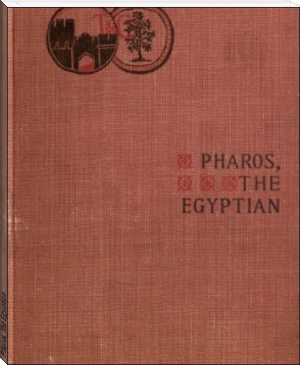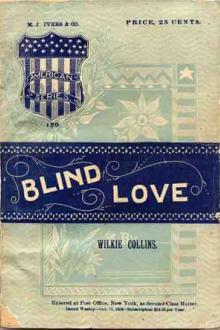Pharos, The Egyptian - Guy Boothby (motivational novels .TXT) 📗

- Author: Guy Boothby
Book online «Pharos, The Egyptian - Guy Boothby (motivational novels .TXT) 📗». Author Guy Boothby
For upward of half an hour I remained where the captain had placed me, drenched by the spray, listening to the dull thud of the seas as they broke upon the deck below, and watching with an interest that amounted almost to a pain the streams of water that sluiced backward and forward across the bridge every time she rolled. Then, summoning all my courage, for I can assure you it was needed, I staggered toward the ladder and once more prepared to make my way below. I had not reached the deck, however, and fortunately my hands had not quitted the guide rails, when a wave larger than any I had yet seen mounted the bulwark and dashed aboard, carrying away a boat and twisting the davits, from which it had been suspended a moment before, like pieces of bent wire. Had I descended a moment earlier, nothing could have prevented me from being washed overboard. With a feeling of devout thankfulness in my heart for my escape, I remained where I was, clinging to the ladder long after the sea had passed and disappeared through the scuppers. Then I descended and, holding on to the rails as before, eventually reached the saloon entrance in safety.
To be inside, in that still, warm atmosphere, out of the pressure of the wind, was a relief beyond all telling, though what sort of object I must have looked, with my hair blown in all directions by the wind and my clothes soaked through and through by the spray that had dashed upon me on the bridge, is more than I can say. Thinking it advisable I should change as soon as possible, I made my way to my own cabin, but, before I reached it, the door of that occupied by the Fraeulein Valerie opened and she came out. That something unusual was the matter I saw at a glance.
"Mr. Forrester," she said, with a scorn in her voice that cut like a knife, "come here. I have something curious to show you."
I did as she wished, and forthwith she led me to her cabin. I was not prepared, however, for what I found there. Crouching in a corner, almost beside himself with fear, and with the frightened face of the monkey Pehtes peering out from beneath his coat, was no less a person than Pharos, the man I had hitherto supposed insensible to such an emotion. In the presence of that death, however, which we all believed to be so imminent, he showed himself a coward past all believing. Terror incarnate stared from his eyes and rendered him unconscious of our scorn. At every roll the vessel gave he shrank farther into his corner, glaring at us meanwhile with a ferocity that was not very far removed from madness.
At any other time and in any other person such an exhibition might have been conducive of pity; in his case, however, it only added to the loathing I already felt for him. One thing was very certain, in his present condition he was no fit companion for the woman who stood clinging to the door behind me. I accordingly determined to get him either to his own cabin or to mine without delay.
"Come, come, Monsieur Pharos," I said, "you must not give way like this. I have been on deck, and I can assure you there is no immediate danger."
As I said this I stooped and placed my hand upon his shoulder. He threw it off with a snarl and a snap of his teeth that was more like the action of a mad dog than that of a man.
"You lie, you lie!" he cried in a paroxysm of rage and fear. "I am cursed, and I shall never see land again. But I will not die--I will not die! There must be some way of keeping the yacht afloat. The captain must find one. If any one is to be saved it must be me. Do you hear what I say? It must be me."
For the abominable selfishness of this remark I could have struck him.
"Are you a man that you can talk like this in the presence of a woman?" I cried. "For shame, sir, for shame! Get up and let me conduct you to your own cabin."
With this I lifted him to his feet and, whether he liked it or not, half led and half dragged him along the saloon to his own quarters. Once there I placed him on his settee, but the next roll of the vessel brought him to the floor and left him crouching in the corner, still clutching the monkey, his knees almost level with his shoulders, and his awful face looking up at me between them. The whole affair was so detestable that my gorge rose at it, and when I left him I returned to the saloon with a greater detestation of him in my heart than I had felt before. I found the Fraeulein Valerie seated at the table.
"Fraeulein," I said, seating myself beside her, "I am afraid you have been needlessly alarmed. As I said in there, I give you my word there is no immediate danger."
"I _am_ frightened," she answered. "See how my hands are trembling. But it is not death I fear."
"You fear that man," I said, nodding my head in the direction of the cabin I had just left; "but I assure you, you need not do so, for to-day, at least, he is harmless."
"Ah! you do not know him as I do," she replied. "I have seen him like this before. As soon as the storm abates he will be himself again, and then he will hate us both the more for having been witnesses of his cowardice." Then, sinking her voice a little, she added: "I often wonder, Mr. Forrester, whether he can be human. If so, he must be the only one of his kind in the world, for Nature surely could not permit two such men to live."
CHAPTER X.
It was almost dark when the yacht entered the harbour of Port Said, though the sky at the back of the town still retained the last lingering colours of the sunset, which had been more beautiful that evening than I ever remembered to have seen it before. Well acquainted as I was with the northern shores of the Mediterranean, this was the first time I had been brought into contact with the southern, and, what was more important, it was also the first occasion on which I had joined hands with the Immemorial East. In the old days I had repeatedly heard it said by travellers that Port Said was a place not only devoid of interest, but entirely lacking in artistic colour. I take the liberty of disagreeing with my informants _in toto_. Port Said greeted me with the freshness of a new life. The colouring and quaint architecture of the houses, the vociferous boatmen, the monotonous chant of the Arab coalers, the string of camels I could just make out turning the corner of a distant street, the donkey boys, the Soudanese soldiers at the barriers, and last, but by no means least, the crowd of shipping in the harbour, constituted a picture that was as full of interest as it was of new impressions.
As soon as we were at anchor and the necessary formalities of the port had been complied with, Pharos's servant, the man who had accompanied us from Pompeii and who had brought me on board in Naples, made his way ashore, whence he returned in something less than an hour to inform us that he had arranged for a special train to convey us to our destination. We accordingly bade farewell to the yacht and were driven to the railway-station, a primitive building on the outskirts of the town. Here an engine and a single carriage awaited us. We took our places and five minutes later were steaming across the flat sandy plain that borders the Canal and separates it from the Bitter Lakes.
Ever since the storm, and the unpleasant insight it had afforded me into Pharos's character, our relations had been somewhat strained. As the Fraeulein Valerie had predicted, as soon as he recovered his self-possession, he hated me the more for having been a witness of his cowardice. For the remainder of the voyage he scarcely put in an appearance on deck, but spent the greater portion of his time in his own cabin, though in what manner he occupied himself there I could not imagine.
Now that we were in our railway carriage, _en route_ to Cairo, looking out upon that dreary landscape, with its dull expanse of water on one side, and the high bank of the Canal, with, occasionally, glimpses of the passing stations, on the other, we were brought into actual contact, and, in consequence, things improved somewhat. But even then we could scarcely have been described as a happy party. The Fraeulein Valerie sat for the most part silent and preoccupied, facing the engine in the right-hand corner; Pharos, wrapped in his heavy fur coat and rug, and with his inevitable companion cuddled up beside him, had taken his place opposite her. I sat in the farther corner, watching them both and dimly wondering at the strangeness of my position. At Ismailia another train awaited us, and when we and our luggage had been transshipped to it, we continued our journey, entering now on the region of the desert proper. The heat was almost unbearable, and to make matters worse, as soon as darkness fell and the lamps were lighted, swarms of mosquitoes emerged from their hiding-places and descended upon us. The train rolled and jolted its way over the sandy plain, passed the battle-fields of Tel-el-Kebir and Kassassin, and still Pharos and the woman opposite him remained seated in the same position, he with his head thrown back, and the same death-like expression upon his face, and she staring out of the window, but, I am certain, seeing nothing of the country through which we were passing. It was long after midnight when we reached the capital. Once more the same obsequious servant was in attendance. A carriage, he informed us, awaited our arrival at the station door, and in it we were whirled off to the hotel, at which rooms had been engaged for us. However disagreeable Pharos might make himself, it was at least certain that to travel with him was to do so in luxury.
Of all the impressions I received that day, none struck me with greater force than the drive from the station to the hotel. I had expected to find a typical Eastern city; in place of it I was confronted with one that was almost Parisian, as far as its handsome houses and broad tree-shaded streets were concerned. Nor was our hotel behind it in point of interest. It proved to be a gigantic affair, elaborately decorated in the Egyptian fashion, and replete, as the advertisements say, with every modern convenience. The owner himself met us at the entrance, and from the fact that he informed Pharos, with the greatest possible respect, that his old suite of rooms had been retained for him, I gathered that they were not strangers to each other.
"At last we are in Cairo, Mr. Forrester," said the latter, with an





Comments (0)